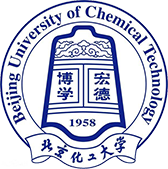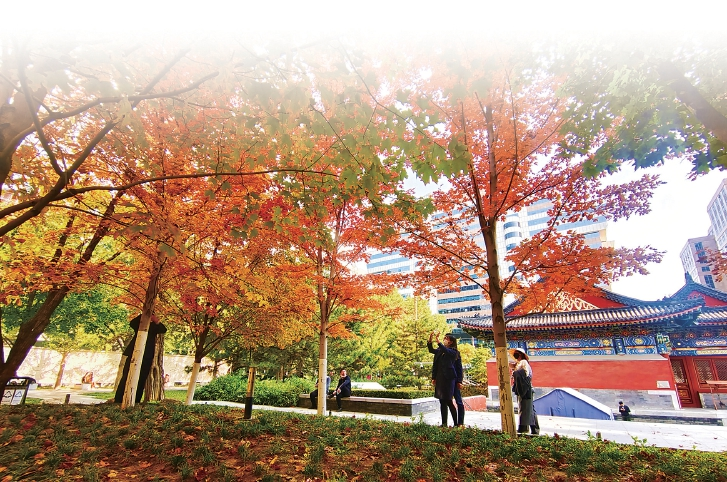School Badge

About Beijing University Of Chemical Technology
The school’s faculty is strong. Vigorously implement the strategy of “strengthening the school with talents”. There are currently more than 2,700 faculty members, including 11 academicians of the Chinese Academy of Sciences (including 1 foreign academician of the Chinese Academy of Sciences, 1 foreign academician of the Chinese Academy of Engineering, 4 dual-employed academicians), and 6 academicians from other countries , 14 special-appointed professors, 3 young scholars in the “Changjiang Scholars Award Program” of the Ministry of Education, 24 winners of the National Outstanding Youth Fund, 24 winners of the National Outstanding Youth Science Fund, 8 “973” chief scientists, national “ten thousand people” Plan” 10 leading talents in science and technology innovation, 3 famous teaching teachers, 5 top-notch young talents, 5 winners of “National Teaching Teacher Award”, 9 national outstanding teachers, 1 national model teacher, and enjoy special government allowances 130 people (including 30 on duty), 1 national outstanding professional and technical talent, 2 winners of the “China Young Female Scientist Award”, 9 national candidates for the “Hundred Thousand Thousand Talents Project”, and winners of the “China Youth Science and Technology Award” 8 people, 5 winners of the “Capital Science and Technology Leading Talents”, 32 winners of the “Beijing-level Teaching Teacher Award”, 1 outstanding undergraduate teaching management staff in Beijing universities, 1 outstanding undergraduate education team in Beijing universities, education There are 69 outstanding talents across the (new) century.The discipline strength of the school has been steadily enhanced. Chemistry and materials science are among the top 1‰ of ESI, and two disciplines of engineering, biology and biochemistry are among the top 1% of ESI. The discipline group “Green Chemistry, Chemical Engineering and Materials” was selected into the ranks of the national first-class discipline construction. The school has 8 first-level discipline doctoral programs, 21 first-level discipline master programs, 2 second-level discipline master programs, 10 master degree authorization categories; 1 first-level discipline national key discipline (covering 5 second-level key disciplines) Disciplines), 2 second-level national key disciplines, 1 national key (cultivation) discipline, 3 first-level disciplines Beijing key disciplines (covering 14 second-level key disciplines), 2 Beijing cross-key disciplines, 3 Second-level discipline Beijing key discipline; 51 undergraduate majors, 8 national-level specialty construction points, 11 national-level first-class professional construction points, 14 Beijing-level characteristic major construction points, 1 Beijing university “key construction of first-class majors “, 3 first-class professional construction sites in Beijing, 13 comprehensive reform pilot majors of the Ministry of Education, 6 pilot majors of the Ministry of Education “Excellent Engineer Education and Training Program”, 8 majors certified by the Ministry of Education for engineering education; 2 national key laboratories , 1 national engineering technology research center, 1 national engineering laboratory, 14 provincial and ministerial key laboratories, 15 provincial and ministerial engineering technology research centers, and 1 social sciences provincial and ministerial base. 8 post-doctoral mobile stations.
The results of school teaching reforms continue to emerge. There are 2 national teaching bases, 1 national quality education base, 2 national experimental teaching demonstration centers, 3 national virtual simulation teaching experiment centers, 12 national off-campus practical teaching bases for college students, and 1 national level Talent training model innovation experimental zone, 1 national university practice education innovation and entrepreneurship base, 5 Beijing-level off-campus talent training bases, 7 Beijing-level experimental teaching demonstration centers, 2 Beijing-level demonstration campus innovation and practice bases, 1 Beijing-level quality education base; 15 national-level quality courses, 15 national-level quality resource sharing courses, 2 national-level quality video open courses, 1 national-level virtual simulation “golden course”, 4 national-level quality courses Online open courses, 6 national-level offline first-class courses, 2 national-level online and offline first-class courses, 37 Beijing-level quality courses, 8 Beijing high-quality undergraduate courses, 1 Beijing-level virtual simulation “golden Courses”, 5 bilingual demonstration courses of the Ministry of Education; 1 Ministry of Education quality textbooks for general higher education, 14 “Twelfth Five-Year” general higher education undergraduate national planning textbooks, 10 Beijing higher education quality textbooks, 4 Beijing higher education High-quality undergraduate textbooks and courseware; 2 first prizes of National Teaching Achievement Award, 9 second prizes of National Teaching Achievement Award, 37 first prizes of Beijing Teaching Achievement Award, 47 second prizes of Beijing Teaching Achievement Award; National Teaching Achievement Award There are 5 teams and 11 outstanding teaching teams in Beijing.
The scientific research work of the school has developed rapidly. The ability to undertake major projects and address the major needs of the country’s economic and social development has been further enhanced. Since 2001, the school has 32 scientific research projects that have won the National Science and Technology Three Awards, 3 National Natural Science Foundation of China Innovation Research Groups, 6 Ministry of Education Changjiang Scholars Innovation Team, ranking among the top universities in the country. A large number of scientific research results have been published in top international academic journals such as Nature and Science, and various scientific research results have been applied to the national cutting-edge science and technology fields. In 2020, the school’s scientific and technological funds will receive 860 million yuan, and 757 domestic patents will be authorized, and 11 foreign patents will be granted.
The school’s ability to transform scientific and technological achievements has been continuously strengthened. The school regards industry-university integration as an important development strategy opportunity, continuously enhances the “four services” capabilities, leads the transformation and upgrading of enterprises, and better contributes to the country’s economic and social development and the capital’s “four centers” construction. The school’s science and technology park was recognized as the “National University Science and Technology Park”, “Beijing SME Entrepreneurship Base” and the fourth batch of “National Technology Transfer Demonstration Institutions”. The science and technology industry has nearly 20 science and technology industry entities that are closely integrated with teaching and scientific research. Relying on the school’s technology and talent advantages, and taking the industrialization of scientific and technological achievements as its business purpose, it has formed a high-tech industry with Beihua characteristics. A series of technologies and a variety of products have been formed in the fields of chemicals, fine chemicals, and new chemical materials. In recent years, in combination with the school’s superior disciplines, local economic development strategies, and the need to improve corporate technological innovation capabilities, the school has also focused on the Pearl River Delta, the Yangtze River Delta, and the Bohai Rim. It has successively established five school-place cooperation including advanced materials and industrial biotechnology. Local research institutes, 5 technology transfer centers and 246 school-enterprise joint R&D institutions.
The school’s international exchanges and cooperation are becoming more extensive. Adhere to the “global development” strategy, focus on improving the international exchange and cooperation system and mechanism, continuously optimize the global cooperation network system, and focus on promoting the “Belt and Road” construction. The school has established partnerships with 156 universities and institutions in 48 countries (regions) including the United States, Britain, France, Russia, Germany, Australia, South Korea, Japan, and Italy. In 2020, 33 new (renewed) inter-school cooperation agreements were signed and 14 new partners were added. There are 3 Beijing international cooperation joint laboratories (research centers) and 3 Beijing international science and technology cooperation bases, and 5 colleges and universities subject innovation and intelligence introduction bases (“111 plan”); With the focus on introduction, 14 intellectual introduction projects have been approved by the Ministry of Science and Technology of the National “High-end Foreign Experts Introduction Program”; there are 18 foreign experts who have long-term positions in the school; actively promote the international exchanges of students, with 61 foreign experts from 18 countries (regions) The universities and institutions have carried out 86 student overseas study projects. Continue to promote the “Beijing-the world’s top 100 universities undergraduate, master and doctoral elite program”, 30 outstanding students were funded by the China Scholarship Council and other funds to go abroad to study for doctorate or doctoral joint training.







